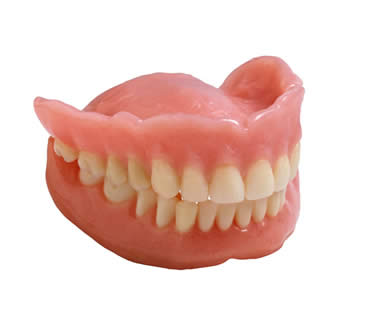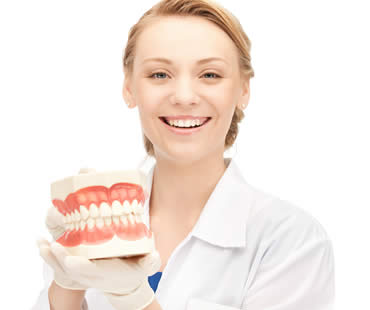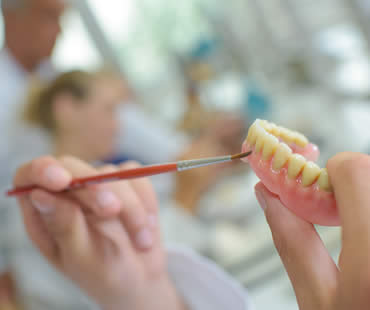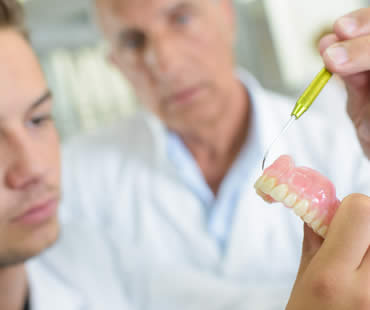
Apr 5, 2019 | Dental Topics 2, Dentures, Blog
You may expect you won’t need dentures because you take good care of your teeth. However, dentures are more prevalent than you may think. The number of adults in the United States needing dentures is expected to increase from 33 million in 1991 to 37 million in 2020. If you are wondering how likely you are to keep your teeth, here are some warning signs that may indicate dentures are in your future.
- You don’t visit your dentist twice a year for regular checkups and routine cleaning. Gum disease and tooth decay are the leading causes of tooth loss; therefore, it is critical to be proactive with dental care to prevent problems that could cause the need for extraction.
- You have gums that are swollen, tender, red, or bleeding which are indications of periodontal disease. Left untreated, gum disease is the primary cause of adult tooth loss.
- Your teeth have become loose, are shifting, or have developed wider gaps between them that can indicate bone loss from gum disease.
- You have severe tooth pain that could be a sign that decay has progressed and is attacking the nerve at the center of the tooth. Once tooth decay has advanced, it is more likely your tooth will need to be removed.
- You are already missing several of your teeth. If you are missing more than two teeth, it is important to replace them with some sort of prosthesis to keep pressure off of your remaining teeth.
- It is difficult for you to eat hard candy or chewy foods, which may indicate a cracked tooth, cavities, or gum disease.
- If you suffer from recurring stomach aches or indigestion, it may be a sign of dental problems. When you can’t chew properly, you end up swallowing larger pieces of food which is hard on your digestion.
Tooth loss does not happen overnight. With proper oral hygiene and regular dental visits, you may be able to avoid or delay the need for dentures in your future.
We look forward to seeing you in our Conyers dental office

May 7, 2021 | Dental Topics 2, Dentures, Blog
If you have been living with a mouth full of badly decayed teeth, infected gums or painful tooth infections, your dentist may have talked to you about how dentures can transform your smile. While no one wants to extract all of his or her teeth and have no remaining natural teeth, if your teeth have been a source of pain and embarrassment to you for years, having a beautiful new set of dentures could sincerely change your life.
Dentures are very natural-appearing replacements for an entire mouth of missing natural teeth and gum tissue. Dentures are removable and can be cleaned thoroughly each day, unlike examples like dental crowns or dental bridges that are permanently affixed to your mouth.
Badly decayed teeth and other oral issues can lead to chronic pain that spreads from the mouth to other areas of the face, head and neck. This pain can disrupt your life, leaving you irritable and moody, causing you to isolate yourself. Pain medications can lead you to feel groggy or off-balance, affecting your interactions with others in a negative manner. Once those teeth are removed and any underlying infection is addressed, you will be shocked at how much better you feel. The absence of this once-ongoing pain will feel as though you are free of a great burden you hadn’t realized you were carrying.
Years of poor oral health might have left you unwilling to smile broadly, or to be uncomfortable in public speaking, laughing or eating and drinking. You may avoid friends and family and you might choose not to form new relationships easily. Once your damaged teeth have been removed and you have been fitted for dentures, you will be amazed at the “new you.” The bright, perfect white smile that greets you in the mirror may look like a movie star’s smile, but in fact, it’s your smile. With your new dentures, you can feel confident as you move through life.
Schedule your appointment at our Conyers dental office

Mar 20, 2020 | Dental Topics 2, Dentures, Blog
If you have lost all of your teeth or just a few, you are probably a good candidate for dentures. Dentures, also known as removable prosthodontics, are used for the dental restoration or replacement of missing or broken teeth. You may want to consider dentures if any of the following apply to your situation:
- You have very few remaining teeth and they are in poor condition.
- You have suffered bone loss in your mouth so severe it precludes you from considering dental implants.
- You have advanced gum disease that has resulted in the loss of multiple teeth.
- You have lost many teeth, and your remaining teeth are suffering from decay and receding gums.
- You are committed to practicing excellent oral hygiene in order to take good care of your dentures.
You may not be a good candidate for dentures if any of the following apply:
- You are a young patient whose jawbone has not fully developed.
- You grind or clench your teeth.
- You have a sensitive gag reflex.
- You are a smoker.
If you feel you are a good candidate for dentures, your dentist will evaluate the health of your teeth and gums and determine if full or partial dentures are the best choice for you. There are many factors to consider when having dentures placed, and your dental professional can help you make a decision that fits your needs and lifestyle. If you wish to regain oral functionality and improve your smile, dentures may be your answer to once again enjoying a full set of beautiful, natural looking teeth.
We treat patients from Conyers and the surrounding area

Jun 12, 2020 | Dental Topics 2, Dentures, Blog
If your teeth are badly damaged from decay or facial trauma, or if you have several missing teeth, your dentist may recommend removable prosthodontics to solve your dental problems. Periodontitis (advanced gum disease), bone loss or serious tooth decay can leave you as a poor candidate for restorative options such as dental crowns, dental bridges or dental implants. Removable prosthodontics can restore your smile so that it looks and functions as it should and can restore your confidence as you eat, smile and laugh.
Just hearing the word “dentures” might give you pause, reminding you of your older relatives, but achievements in dental restorative therapies enable your dentist to craft a removable prosthodontic for you that will not only look, but will feel like your natural smile.
Removable prosthodontics include:
- Partial dentures correct gaps when only a few of your natural teeth are missing. A partial denture may be the best choice if your remaining teeth aren’t strong enough to support a dental bridge.
- Overdentures provide restorations when one or more of your natural teeth are in place in an arch – typically two teeth for a bottom overdenture and four teeth for an upper overdenture.
- Immediate dentures are put in place following an extraction, allowing the bone and gums to recover following an extraction procedure. They prevent the adjacent teeth from collapsing upon the empty space and affecting your bite.
- Complete dentures are for edentulous patients (patients with no teeth at all) and are designed to replace all of the teeth in one or both arches of your mouth, restoring your smile and your ability to eat and speak clearly.
Because of advancements in materials and techniques, many dentures can be mistaken for natural teeth. Only you – and your prosthodontist – will know your secret. Talk to your prosthodontist today to see what removable prosthodontics can do for you. Don’t wait to begin enjoying your life with your new, healthy smile.
If you need a dentist in Conyers contact us today

Jan 15, 2021 | Dental Topics 2, Dentures, Blog
Thanks to advances in dental technology, dentures are more natural looking and comfortable than ever before. If you are one of the many adults wearing dentures to replace missing teeth, there are several do’s and don’ts you will want to follow to ensure they maintain their fit and your oral health:
- Do take your dentures out before going to bed, allowing your mouth tissues to rest from wearing them all day.
- Don’t let your dentures dry out. Soak them in mild denture solution or water while you sleep.
- Do clean them daily with either a mild detergent or special denture cleaning solution and a soft-bristled brush.
- Don’t soak them in very hot water, as this could cause them to warp, and they will no longer fit properly.
- Do handle them with care. Dropping your dentures or treating them with strong cleansers or harsh brushes can do permanent damage.
- Don’t neglect your oral care for the rest of your mouth. Even patients with a full set of dentures need to take care of their gums, and if you have partial dentures you should continue to brush and floss your remaining teeth regularly.
- Do pay attention to changes in the fit or feel of your dentures. Problems with fit can lead to irritation and discomfort, and could also be an indication of gum disease.
- Don’t try to adjust or repair your dentures on your own. If your dentures are ill-fitting or damaged in any way, schedule an appointment with your dentist to have them evaluated.
- Do continue to see your dentist for regular checkups to help maintain your best oral health and check your dentures for fit and function.
If you are missing all or some of your teeth, dentures can greatly improve both your appearance and the quality of your life. By following these simple guidelines, you can maintain the beauty and functionality of your dentures for many years.
If you live in the Conyers area contact us today

Jul 13, 2018 | Dental Topics 2, Dentures, Blog
An implant overdenture combines the use of traditional dentures and implant technology to create a denture that fits over your remaining natural tooth roots or dental implants. These root or implant supported dentures are held in place by dental attachments which provide excellent stability and support for your dentures. Overdentures were developed to help patients missing some or all of their teeth regain a quality of life that may have been lacking since they lost their teeth.
There are several benefits to implant overdentures when compared to traditional dentures:
- Saving your natural roots or having implants placed slows bone loss by stimulating the bone in your jaw when you eat or chew.
- Because overdentures are better fitting by design, they are more stable and allow you to chew food more thoroughly. This promotes better digestion and allows you to absorb more nutrients.
- The increased stability provided by overdentures also means you are able to speak more clearly, as there is no slipping or clicking of your dentures.
- Loose dentures are not a worry with overdentures. Sticky adhesives and messy denture creams are unnecessary when you have implant overdentures.
- With overdentures, the natural shrinkage that occurs from an under-stimulated jaw does not occur. This keeps your face from looking sunken, as can often happen with traditional dentures.
To find out if you are a candidate for implant overdentures, schedule an evaluation by your dental professional. Overdentures could be the best, most natural treatment for restoring your oral health and beautiful smile.
We look forward to seeing you in our Conyers dental office








